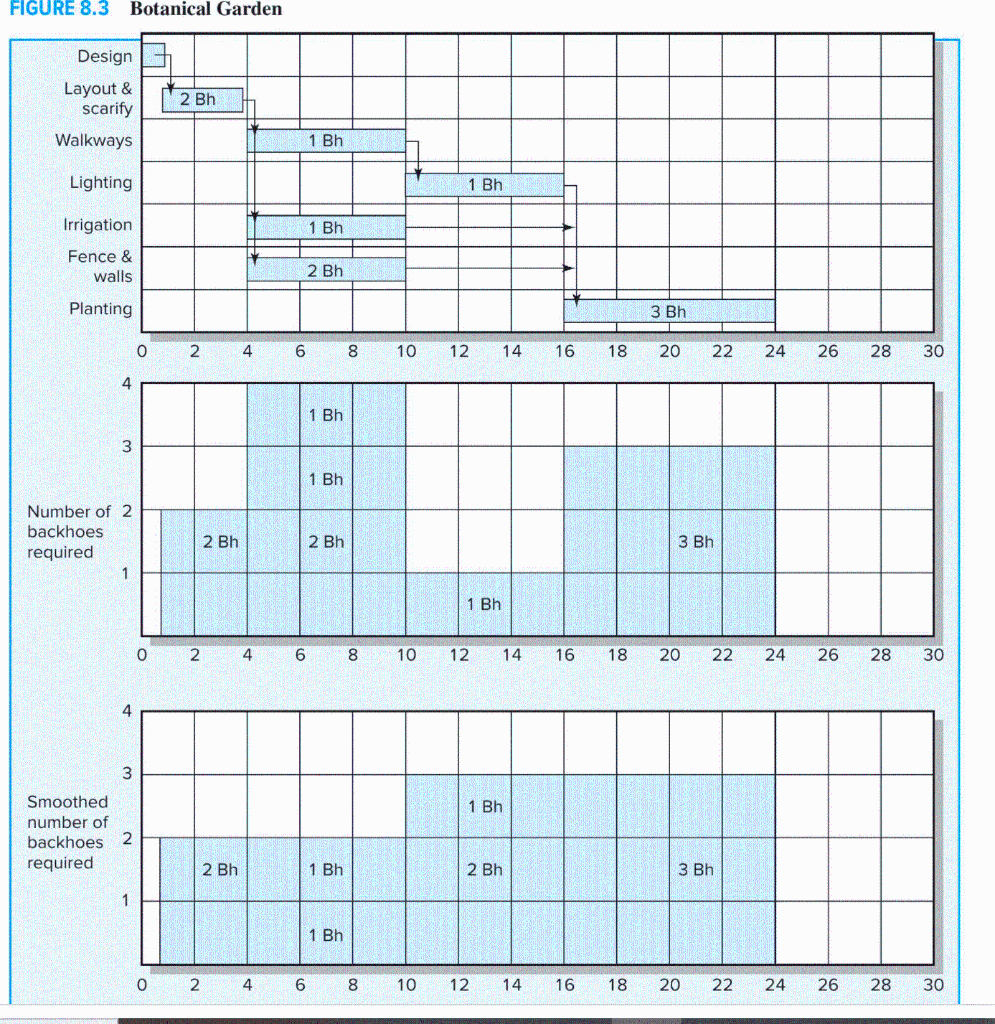Question
Scheduling time-constrained projects focuses on resource utilization. When demand for a specific resource type is erratic, it is difficult to manage, and utilization may be
Scheduling time-constrained projects focuses on resource utilization. When demand for a specific resource type is erratic, it is difficult to manage, and utilization may be very poor. Practitioners have attacked the utilization problem using resource leveling techniques that balance demand for a resource. Basically all leveling techniques delay noncritical activities by using positive slack to reduce peak demand and fill in the valleys for the resources. An example will demonstrate the basic procedure for a time-constrained project. See Figure8.3.For the purpose of demonstration, the Botanical Garden project uses only one resource (backhoes); all backhoes are interchangeable. The top bar chart shows the activities on a timescale. The dependencies are shown with the vertical connecting.

This is a re-do of Section 8-3, the botanical garden project (Figure 8.3), but where now you have only two backhoes available for this project. For this scenario, now assume that the Planting activity which uses three backhoes over an eight-day period (24 backhoe-days) in the first two scenarios can be extended to utilize two backhoes over a longer period of time. The goal is still to finish the project in the shortest time, even though it would take longer than the 24 working days in scenarios 1 and 2. You can include Saturdays, Sundays, and/or Holiday Days as working days if you wish your choice. What still counts are the total number of working days to complete the project. For this project write a report that is your proposal to upper management of your plan for the management on the botanical garden project:
1. Include an introduction in your report which explains the botanical garden project (using your words, not the texts and not from your classmates). (5 pts)
2. Include a section in your report that explains the conditions, assumptions, constraints, etc. of the project (for example, the two-backhoe resource limitation). Again, using your words. (5 pts)
3. Include a section in your report that leads the reader through the process you used and the interpretation of your results. (5 pts)
4. Include a section of the MS Project results. As a minimum, that would be: WBS, Gannt Chart, and Network chart (a network chart wasnt presented in Section 8-3, but develop one for this exercise). Make sure you include WBS hierarchical activity numbers (1, 1.1, 1.2, etc) and activity resource loading (1Bh or 2Bh) in your MS Project analysis. (30 pts)
5. Include a conclusion section that summarizes for the reader your final project plan proposal to upper management. (5 pts)
FIGURE 8.3 Botanical Garden Design 2 Bh Layout & scarify Walkways 1 Bh Lighting 1 Bh 1 Bh Irrigation Fence & walls 2 Bh Planting 3 Bh 8 0 2 4 6 00 10 12 14 16 18 20 22 24 26 28 30 4 1 Bh 3 3 1 Bh Number of 2 backhoes required 2 Bh 2 Bh 3 Bh 1. 1 Bh 0 2 4 6 00 10 12 14. 16 18 20 22 24 26 28 30 4 1 Bh 3 Smoothed number of backhoes 2 required 2 Bh 1 Bh 2 Bh 3 Bh 1 1 Bh 2 o N 4. 6 8 8 00 10 12 14 16 18 20 22 24 26 28 30 FIGURE 8.3 Botanical Garden Design 2 Bh Layout & scarify Walkways 1 Bh Lighting 1 Bh 1 Bh Irrigation Fence & walls 2 Bh Planting 3 Bh 8 0 2 4 6 00 10 12 14 16 18 20 22 24 26 28 30 4 1 Bh 3 3 1 Bh Number of 2 backhoes required 2 Bh 2 Bh 3 Bh 1. 1 Bh 0 2 4 6 00 10 12 14. 16 18 20 22 24 26 28 30 4 1 Bh 3 Smoothed number of backhoes 2 required 2 Bh 1 Bh 2 Bh 3 Bh 1 1 Bh 2 o N 4. 6 8 8 00 10 12 14 16 18 20 22 24 26 28 30Step by Step Solution
There are 3 Steps involved in it
Step: 1

Get Instant Access to Expert-Tailored Solutions
See step-by-step solutions with expert insights and AI powered tools for academic success
Step: 2

Step: 3

Ace Your Homework with AI
Get the answers you need in no time with our AI-driven, step-by-step assistance
Get Started


